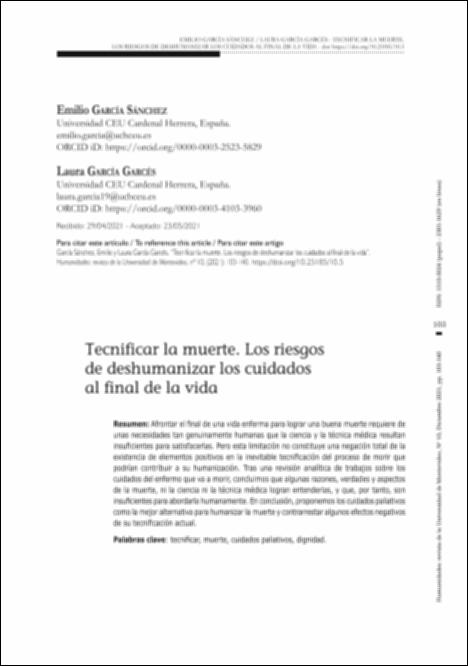Please use this identifier to cite or link to this item:
http://hdl.handle.net/10637/13734Tecnificar la muerte : los riesgos de deshumanizar los cuidados al final de la vida
| Title: | Tecnificar la muerte : los riesgos de deshumanizar los cuidados al final de la vida |
| Other Titles: | Tecnificar a morte : os riscos de desumanizar os cuidados no fim da vida Technifying death : the risks of dehumanizing end-of-life care |
| Authors : | García Sánchez, Emilio García Garcés, Laura |
| Keywords: | Palliative treatment.; Cuidados terminales.; Cuidados paliativos.; Terminal care.; Dignidad.; Muerte.; Death.; Dignity. |
| Publisher: | Universidad de Montevideo, Facultad de Humanidades y Educación Universidad de Montevideo, Centro de Documentación y Estudios de Iberoamérica |
| Citation: | García Sánchez, E. & García Garcés, L. (2021). Tecnificar la muerte : los riesgos de deshumanizar los cuidados al final de la vida. Humanidades: revista de la Universidad de Montevideo, n. 10 (02 dic.), pp. 103-140. DOI: https://doi.org/10.25185/10.5 |
| Abstract: | Afrontar el final de una vida enferma para lograr una buena muerte requiere de
unas necesidades tan genuinamente humanas que la ciencia y la técnica médica resultan
insuficientes para satisfacerlas. Pero esta limitación no constituye una negación total de la
existencia de elementos positivos en la inevitable tecnificación del proceso de morir que
podrían contribuir a su humanización. Tras una revisión analítica de trabajos sobre los
cuidados del enfermo que va a morir, concluimos que algunas razones, verdades y aspectos
de la muerte, ni la ciencia ni la técnica médica logran entenderlas, y que, por tanto, son
insuficientes para abordarla humanamente. En conclusión, proponemos los cuidados paliativos
como la mejor alternativa para humanizar la muerte y contrarrestar algunos efectos negativos
de su tecnificación actual. Facing the end of life, achieving a good death requires such genuinely human needs that science and medical technique are insufficient. But this limitation does not constitute a total denial of the existence of positive elements in the inevitable technicalization of the dying process that could contribute to its humanization. After an analytical review of the scientific literature on the care of terminal patients, we conclude that there are some reasons, truths and aspects of death that science and medical technique fail to understand, and that, therefore, are they insufficient to deal with them humanely. In conclusion, we propose palliative care as the best alternative to humanize death and counteract some negative effects of its current technification. Encarar o fim de uma vida enferma para obter uma boa morte requer necessidades tão genuinamente humanas que a ciência e a técnica médica são insuficientes para satisfazê-las. Mas essa limitação não constitui uma negação total da existência de elementos positivos na inevitável tecnificação do processo de morrer que poderiam contribuir para sua humanização. Após uma revisão analítica de trabalhos sobre o cuidado ao paciente que vai morrer, concluímos que alguns motivos, verdades e aspectos da morte, nem a ciência nem a técnica médica conseguem compreendê-los, e que, portanto, são insuficientes para abordálos humanamente. Conclusão, propomos os cuidados paliativos como a melhor alternativa para humanizar a morte e neutralizar alguns efeitos negativos de sua atual tecnificação. |
| Description: | Este artículo se encuentra disponible en la siguiente URL: http://revistas.um.edu.uy/index.php/revistahumanidades/article/view/839/1024 Este número lleva por título "Cultura, Tecnología y Naturaleza Humana". |
| URI: | http://hdl.handle.net/10637/13734 |
| Rights : | http://creativecommons.org/licenses/by-nc/4.0/deed.es |
| ISSN: | 1510-5024 2301-1629 (Electrónico) |
| Issue Date: | 2-Dec-2021 |
| Center : | Universidad Cardenal Herrera-CEU |
| Appears in Collections: | Dpto. Ciencias Políticas, Ética y Sociología |
Items in DSpace are protected by copyright, with all rights reserved, unless otherwise indicated.


